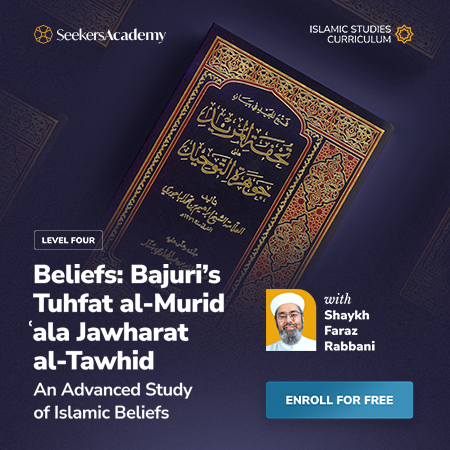
In this important study, Shaykh Faraz Rabbani reads Imam Bajuri’s Hashiya on Imam Laqani’s famous poem, Jawharat al-Tawhid. Imam Laqani’s poem covers mainstream Islamic beliefs about Allah Most High, His messengers (peace be upon them), and the Hereafter. This Hashiya is regarded as the most relied-on commentary of the Jawhara. It provides a very clear explanation and mentions various opinions that differ each other by the expert in this field.
This class is an advanced class for upper intermediate level students who have studied two or three complete texts in Islamic Beliefs, with a teacher.
This course falls under Level Four of SeekersGuidance’s Islamic Studies Curriculum.
The purpose of this course is to master the nuances of the science of Islamic beliefs by covering one of the most authoritative late commentaries in mainstream Islamic beliefs according to the Ash‘ari school, Tuhfat al-Murid.
This course is crucial for students of beliefs to take to deepen their knowledge by understanding nuances and details and the critical issues in theology.
They will learn the building blocks of how to present faith in a clear and cogent manner and how to defend it from confusion and the arguments of those who reject faith.
Students will learn the methodology of the science of Islamic Theology and its deep underlying principles—through teaching and recommended readings of the reference works by the great Imams of Islamic Beliefs.
This course is not for beginners, it focuses on broadening the horizons of the students by building on previous foundations.
Students need to be able to follow and understand the Arabic text, as the text will be read in Arabic, and explained in English.
- Teacher: Shaykh Faraz Rabbani
Imam Laqqani’s poem Jawharat al-Tawhid (Jewel of Divine Unity) has been broadly accepted by the scholarly community as a summary work representative of mainstream Islamic beliefs. In the hundreds of years that have passed since its authorship, this work has attracted dozens of commentaries and super-commentaries.
These commentaries include the author's own three commentaries, including his 2,400-page Umda al-Murid; his son's commentary, Ithaf al-Murid—which was edited by Shaykh Muhyi al-Din ‘Abd al-Hamid and also has the famous marginalia called Hashiya al-Amir; Imam Bajuri’s commentary, Tuhfat al-Murid; Imam Sawi’s commentary; and the modern commentary of Shaykh Tattan, ‘Awn al-Murid.
Imam Bajuri’s commentary is accepted as being one of the most reliable and authoritative late works of the Ash‘ari school. It is nuanced, and representative in its illustrations of the beliefs and authoritative in its judgements; it is a must study for advanced students.
Shaykh Adib Kallas referred to Imam Bajuri and this work as “one of the finest verifications of the creed of mainstream Islamic beliefs.”
Students are recommended to have completed at least one Level Two and one Level Three text in the Seekers Islamic Studies Curriculum before the study of this work.
- This course is for advanced students of Islamic Beliefs
- It is a Level Four course. In order to successfully complete this course, students should take at least one Level Two and one Level Three text in the Seekers Islamic Studies Curriculum, or equivalent.
- Understand the advanced concepts of Islamic Beliefs
- Understand how to present the sound understanding of faith in a clear and cogent manner.
- Learn how to defend mainstream understanding from confusion and the arguments of those who reject faith
- Appreciate the subtleties of the arguments of the scholars of Islamic Beliefs
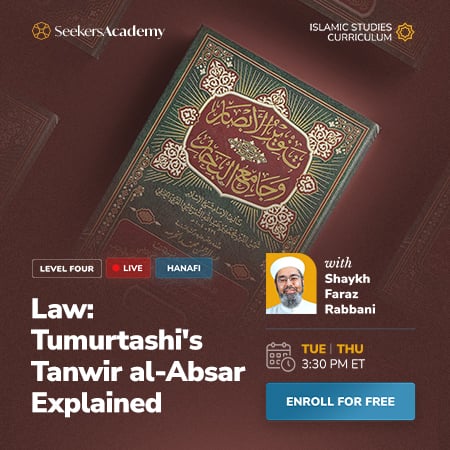
The objective of this course is to begin the journey of gaining mastery of the Fiqh details of the Hanafi school.
We define “Mastery” as a thorough understanding of the text itself, its legal reasoning, and key details.
"Fiqh" is deep knowledge, with an understanding of nuances and implications.
"Fiqh" is deep knowledge, with an understanding of nuances and implications.
Through extensive readings in Haskafi’s Durr al-Mukhtar and Ibn Abidin’s Radd al-Muhtar, along with multiple articles and inputs from contemporary scholars, students receive a solid understanding of what it entails to be a jurist of service to his community.
The purpose of this mastery is to seek the pleasure of Allah, through benefiting oneself and others by preserving, acting upon, and transmitting this noble Prophetic inheritance in ways that assist others in seeking the pleasure of Allah by following Divine Guidance with conviction and clarity.
- Teacher: Shaykh Faraz Rabbani
- Teacher: Shaykh Yusuf Weltch
The main textbook for this course is the meta-matn Imam Tumurtashi’s Tanwir al-Absar that is the basis of the central commentary for legal details Haskafi’s Durr al-Mukhtar in the later Hanafi school–and for the central work for the fatwa positions of the Hanafi school Ibn Abidin’s Radd al-Muhtar.
- This course is for adults.
- It is particularly beneficial for students of Islamic Law..
- This is an upper-intermediate to advanced class in Hanafi Fiqh. Students need to have completed at least two complete works in all chapters of Hanafi fiqh, including at least one intermediate-level commentary (such as Sharh al-Wiqaya, or the Ikhtiyar, or Hidaya, or similar), with understanding.
- Understand the text studied properly.
- Navigate through the different opinions of the Hanafi School.
- Be familiarized with contemporary issues.
- Learn how to research issues in the Hashya of Ibn Abidin.
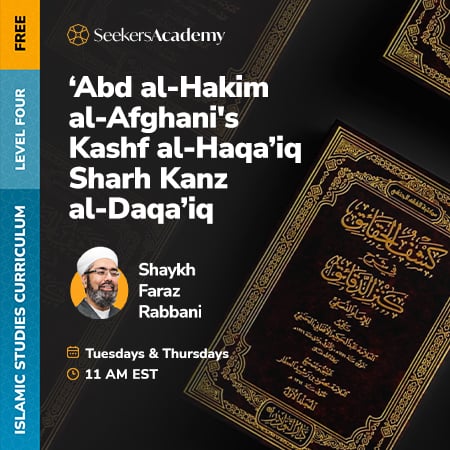
This course is based on Imam Nasafi's Kanz al-Daqa‘iq with its commentary Kashf al-Haqa’iq by ‘Allama Abd al-Hakim al-Afghani. Within this class, the commentary will be read in full length and explained further by Shaykh Faraz Rabbani.
The key text gathers issues from several of the key works of the school to summarize its issues. The purpose of this class is to consolidate previous foundations. Moreover, it aims to deepen one's understanding of the various chapter of law. This includes the chapters on worship as well as the chapters on financial transactions. Furthermore, rulings concerning personal circumstances such as marriage, divorce, and inheritance will be taught.
The Prophet Muhammad (peace and blessings be upon him) said, “Whomever Allah wants good, He gives him a deep understanding of the religion.” [Agreed Upon – Bukhari, Muslim]
The outcomes of this course are to clearly know the rulings within the various fields with an outlook on the proof outlined by the commentator. This course is on an advanced level and aims to consolidate one’s previous study of the subject.
- Teacher: Shaykh Faraz Rabbani
This course is based on Imam Abu Barakat al-Nasafi's Kanz al-Daqa’iq, referred to by many as the greatest of the summary works (mukhtasarat) in the Hanafi school. This work is very precise, nuanced, and terse, yet very comprehensive.
The Kanz is a summary of another of the author's works, the Wafi, an advanced text in the Hanafi school. The Kanz is not a beginner text, as some of its chapters can be difficult to understand and grasp. This highlights the importance of a study of another primer prior to the study of the Kanz; the Kanz builds on previous foundations.
The Kanz has many great and important commentaries (shuruh), such as Tabyin al-Haqa’iq of Zayla‘i’, al-Bahr al-Ra’iq of Zayn ibn Nujaym (which also has the marginalia of Ibn ‘Abidin called Minhat al-Khaliq). Other crucial commentaries are al-Nahr al-Fa’iq of ‘Umar ibn Nujaym, the commentary of Munla Miskin with the marginalia of Abu al-Su‘ud al-Husayni al-Misri known as Fath Allah al-Mu‘in, and many more. Later works in the school, such as the Tanwir al-Absar of Imam Tumurtashi, were built upon the Kanz. This further proves the deep influence and importance of Imam Nasafi’s Kanz al-Daqa’iq.
The commentary referenced in this class will be the commentary of ‘Allama ‘Abd al-Hakim al-Afghani, called Kashf al-Haqa’iq. The commentator benefits greatly from the previous commentary of the Kanz, such as al-Bahr al-Ra’iq, as well as al-Hidaya and its commentaries. The commentator focusses on the legal reasoning behind the rulings while laying out their textual proofs.
While referring to himself in the third person, the commentator mentions in his introduction: “What he didn't ascribe to anyone is definitely taken from the author of al-Hidaya [i.e. Imam Marghinani]. Therefore, it should be understood that this collection is a summary of the Hidaya.”
Furthermore, the three-volume Maktabat al-Bushra print of Kanz al-Daqa’iq, which includes a composition of various commentaries, will be relied upon for unlocking the key text itself.
- This is an advanced level class in Hanafi fiqh (Level Four) of the Seekers Islamic Studies Curriculum.
- Students are expected to have completed the equivalent of the Level Two and Three requirements in Hanafi fiqh. This could be fulfilled by having completed the study of works such as Quduri and Kanz al-Daqa’iq or Multaqa al-Abhur under a teacher.
- This course can also be taken by anyone who is interested in supplementing their understanding of advanced Hanafi Law.
- It is particularly beneficial for advanced students of Hanafi Law.
- Know and clearly understand the legal rulings of all chapters of fiqh on an advanced level.
- Get an insight into the Hanafi school's line of legal reasoning (istidlal).
- Become well-versed in the Hanafi school's textual proofs.
- Complete the study of advanced work in the Hanafi school.
- Be primed to study even more advanced works of the Hanafi school of law.
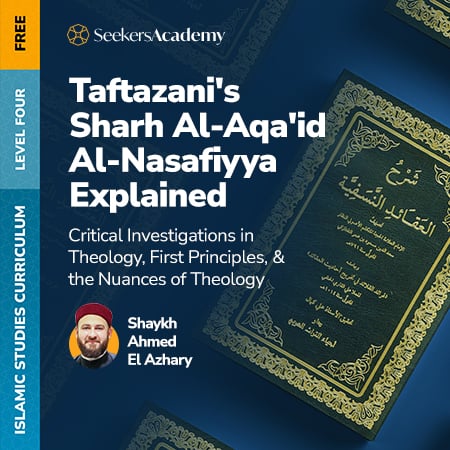
This is a Level Four course on Islamic Beliefs in the Islamic Studies Curriculum. It unpacks the questions (masa’il) of Taftazani’s pithy Sharh al-’Aqa’id al-Nasafiyya, arguably the most important textbook ever written in the science of Islamic theology.
This course explains the intellectual context in which the book’s questions are set, and then applies those questions to contemporary theological problems, with a special focus on modern science and occasional digressions into Western philosophy.
Take this course with Shaykh Ahmed El Azhary to understand what the science of kalam is; the historical circumstances that led to its development; who the Mu’tazilites were and why they are important; who the falasifa were and why they are important; what philosophical skepticism is, what motivates it, its relevance to kalam, and how it should be tackled; what human knowledge is and how to distinguish truth from falsehood; the epistemological value of sensation, rational inference, historical transmission, and revelation; and the relation of all of these topics to non-religious historical accounts of Islamic theology, cognitive psychology, and evolutionary accounts of human development.
For centuries, Taftazani’s Sharh al-’Aqa’id has been a standard and indispensable part of curricula in traditional institutions of learning all over the Muslim world. No other textbook in any of the Islamic sciences has as many scholarly glosses (hawashi) as it does. The importance of a textbook can be judged by the number of glosses that have been written on it. The innumerable glosses on Sharh al-’Aqa’id by scholars in the Ottoman Empire, in al-Azhar, in the Indian Subcontinent, and elsewhere make it the most important textbook of Islamic theology ever written.
- This course is for dedicated students of knowledge
- This is a Level Four course. Before taking this course, take all courses in Level Three, especially Beliefs: Bajuri's Hashiya al-Sanusiyya Explained: Allah's Attributes and Proofs for His Existence.
- This course can also be taken by anyone who wants to learn Islamic Beliefs at an advanced level.
- Use the epistemology from this to prove the existence of God.
- Respond to medieval and modern objections against the existence of God.
- Describe the cosmology and metaphysics of the falasifa and their role in the development of kalam.
- Learn when to update theological issues in light of modern science and when to use theological issues to correct modern science.
- Navigate contemporary debates over the existence of God using traditional Islamic theology.
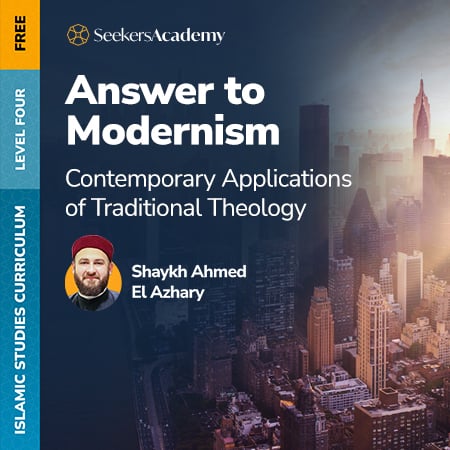
This is a Level Four course in the Islamic Studies Curriculum.
This course covers how to address modern challenges to belief through the application of traditional Islamic Theology (`Ilm al-Kalam) to contemporary intellectual challenges. This course is based on a book called Answer to Modernism.
The course focuses on understanding the Seven Guiding Principles and their application to sixteen types of newly-arisen doubts. It helps students grasp the epistemological underpinnings of contemporary challenges and articulate theological responses that utilize their study of the sacred sciences in modern-day contexts.
This course is aimed primarily towards students of Kalam (Islamic Theology), but students of other sciences could also benefit from it. While it does incorporate responses to newly-arisen doubts, the course is not organized in a “doubt vs. response” structure. It is more of theological modeling on how to approach and respond to newly-arisen doubts. The doubts and responses included within the course are studied as particular “cases” through which students can observe the application of theological principles.
- Teacher: Shaykh Ahmed El Azhary
This course is based on the deep reading of a book called Answer to Modernism. It is considered to be one of the earliest responses written by traditionally trained Muslim scholars to challenges posed by Modernity. Facing the invasion of Muslim “epistemological spaces” by colonialism, the author contextualizes concepts from sacred sciences to address newly-arisen doubts.
The book is comprised of a preface that includes three counsels on the Muslim’s duty towards newly-arisen doubts; an introduction devoted to the Classification of Knowledge and the Hierarchy of Sciences; a first part: on seven guiding principles for theological responses to contemporary challenges; a second part: on sixteen intimations addressing sixteen sorts of newly-arisen doubts; and a conclusion.
- This course is for adults.
- It is particularly beneficial for students of knowledge, more specifically students of Kalam (Islamic Theology).
- It is a Level-Four course. The successful completion of Level Three of the SeekersGuidance Islamic Studies Curriculum is a prerequisite.
- It is also useful for imams, teachers, and educators.
- Understand the epistemological grounds of newly-arisen doubts.
- Conceptualize the relevance of the Classification of Knowledge and Hierarchy of Sciences to the current intellectual crisis.
- Analyze the intellectual challenges facing the Islamic Tradition nowadays.
- Articulate theological responses to contemporary challenges.
- Apply theological guiding principles in their responses to present-day questions and doubts.
- Address the roots of challenges posed by Modernity.